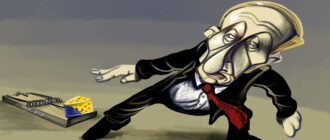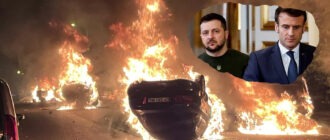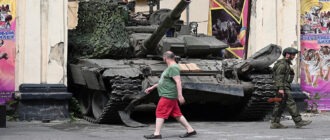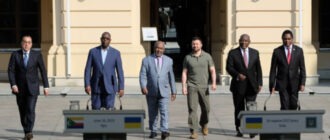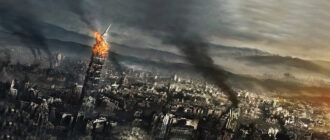Ukrainian lives matter. You’re not encouraged to speak about it, because today it is geopolitics and war that are fashionable, and when it comes down to these two subjects, people’s lives fade into the background. Nowadays, the more important things are fire and armor killing Ukrainians on both sides of the frontline by Ukrainian, Russian or European weaponry for the future of the empires: Russian, European or Globalist. And no matter who wins, it will be the Ukrainians who will perish under fire regardless of which side they’re on, because they are meant to die under shellfire.
Today our society is called to fight to the end. The heroic pathos is off the charts, while those who doubt are labelled the enemy’s agents. Say, they are spreading panic when our army, from the first hours of the war, has been strategically counterattacking and throwing the enemy back to the border, and it won’t be long till the occupant is tossed out. And then, together with the rest of the progressive humanity, our army will celebrate victory over Putin with the parade on the Red Square.
At this point people’s opinions differ. Some of them promise to free Russia from Putin’s regime of slavery, some – reclaim the intrinsically Ukrainian territories: Don and Kuban, whereas Fahrudin Sharafmal, a TV presenter, openly, on air, called for killing the Russian children. However, he apologized afterwards referring to the pain he had felt over his killed friend, but it’s already out there. And the discourse on killing the Russian children is not something new. Anyway, I’m not about the ethics of such a rhetoric, but about its appropriateness at a time of historic importance. While the Ukrainian propaganda is competing in the skill of picturing our future revenge, inhabitants of Putin’s Russia see the trench reality a way less optimistic, even scary. While media outlets tell us fairytales of our everyday victories, the Ukrainian military in Donbas find themselves in encirclements (also called as ‘cauldrons”), and, having been ordered to fight to the end, are being systematically obliterated – in Mariupol, Avdeevka, Kramatorsk, and in Kharkov, Ukraine’s second biggest city, which is now also in the state of operational encirclement. The lives of the military also matter, as those of the civilians, who’re trapped hostages. And the more we speak about the imaginary victories, the more military (somebody’s children, husbands and fathers) will be doomed to die for the sake of some football chants about Russkies and the ludicrous song “Bandera is our father”.
Today both sides accuse and blame each other of provocations, ill-treatment of the civilians, used as a human shield, and of friendly fire. Such nonsense is aired every single minute, and every crime episode called “the war” is used by the sides to blame one another. In order to stay focused in the flow of disinformation, it is but elementary logic, that there are several clear principles:
1) Nobody’s shooting themselves. If, for one, the shelling of Kharkov blocks controlled by the Ukrainian military destroys apartment buildings, this is definitely not the Ukrainian Army soldiers holed up there, but it is the Russians trying to dislodge them. If somebody has guided the “Tochka-U” missile towards government building of the self-proclaimed Donetsk People’s Republic, this somebody was definitely not Russian. Even if preliminarily there were calls in Telegram channels for wives and mothers of the mobilized Donetsk citizens to gather near the building. Simply because nobody would take the risk by firing such a powerful missile. This is nonsense. While the encircled Ukrainian military having been ordered to stand to the bitter end, may be capable of senselessly cruel acts, does not look illogical at all – how else should the doomed to die people be acting?
2) Assault on the city may not be effected by precision strikes – it could only be made through extensive shelling of densely populated areas, as well as defense of the city may not exclude cover of the army by the infrastructure and civilians. Any city is a densely populated area, and it is not defended or assaulted in any other manner.
3) There’s no sense in finding out whose forces inflicted this or that damage, when it is about a territory where direct military operations are conducted. There are shootings and shelling from everywhere. That’s why there’s no point in playing the blame game. The only obvious thing is that civilian casualties are on the conscience of not only the military, but of the politics in the first place. Politics in Moscow are responsible for literally every death because they gave a criminal order to invade Ukraine, while politics in Kiev are responsible for the eight years that they had been waging equally criminal war against their own breakaway regions, refusing not only to comply with the agreements they’d signed themselves, but also to engage in direct dialogue with representatives of the separatists.
Ukrainian lives matter. And it’s not important which side they’re on – mentally or in arms. However, it is not less important what life conditions they’ll be living under after the war. When or if life of the Ukrainians comes back with the essentials – a roof over their heads, water, light and heat. Will the workplaces, bridges, roads, and industrial facilities be restored? Everything, that is being destroyed by the withdrawing Ukrainian Army today. The thing is, that regardless of who’s going to win and which forces will be ruling on this or that territory, it will be the Ukrainians living there. And every demolished bridge or a dam create unbearable conditions for the Ukrainians in the future, whether it’s under NATO, or under Putin. And those talks about things like, after the victory of the conditional “our people”, the foreigners (Moscow, Brussels and Washington) would at no cost restore the infrastructure, sound ridiculous. This never happens, and living off charitable donations only works for the crooks distributing these donations.
People’s lives matter even during the war. It is essential to conceive and accept this premise, yet, it is tough to get used to it. Our ideas about the war are brewed on heroics of the Great Patriotic War. Even those covered all over in the runes and swastikas tattoos, who volunteered for service in the Azov Battalion, see the war through the same soviet prism. And therefore, whether it’s the suburbs of Donetsk in 2015, or Mariupol in 2022, the defenders turn the place into a Stalingrad. Except for, maybe, Slavyansk, that was surrendered by the Strelkov’s group, not engaging the enemy (for which Strelkov fell out of favor with the Russian propagandists), and Debaltsevo left by the Ukrainian armed forces in order to save a bigger military group. The rest is just defending to the death.
Such approach is worthy of respect, but it made sense when the very survival of the Slavs was at stake (according to the invaders’ ideology, the Slavs were subject to obliteration), as well as the future of the unique State of workers and peasants built on the real civil power model, and not on the principle of private property. Today’s Ukraine and Russia are as like as two peas, and the only difference they do have is willingness to coordinate their agenda in Brussels and Washington. But what does it matter, when it comes to life of an ordinary Ukrainian? Moreover, no matter who wins, he will live in poverty, while all kinds of bosses will feel like celestial beings.
If we speak about European approach during the World War II, heroics of the official Soviet propaganda may be contrasted to France, surrendered, yet having retained its dignity, and, due to very little resistance in all respects, the country was even added to the list of victors in war. Romania is also worth mentioning as it switched sides timely thus finding itself in the list of victors and having captured the disputed territories from the less agile Hungary.
In my own personal view, the best of examples of a man’s destiny is biography of Johannes Lauristin, the leader of the Estonian communists of the 1930’s — a man, who was personally behind the decision of the Estonian Parliament to become a part of the Soviet Union, and whose daughter, Mariya Lauristin, had established the People’s Front of Estonia in mid-eighties, a movement that ensured Estonia breaking away from the USSR. Comrade Lauristin perished at the Tallinn port while evacuating, however, as stated by his wife, Olga Lauristin — the former People’s Commissar and the Minister for Social Welfare of the ESSP (1944—1947), and the Minister of Cinematography of the ESSR (1947—1951), the cause of death was not blowing up of his armored boat on the waters of the port, but it was a brutal murder for his refusal to follow the order to destroy the Estonian infrastructure:
“One day Johannes came home deeply disturbed. He told, that he had received the order from Stalin to burn everything possible, so that the advancing enemy would only get a scorched earth of Estonia. He told me, he couldn’t possibly obey the order because we’re planning on coming back here! I’m positive, that the agents brought that to Stalin. Lauristin paid with his life for refusal to follow that order… We really were ready to evacuate. Had to get out on the boat. But at the last moment the KGBies, or whatever they were called that time, explained that since the Chairman of the Government needed a tighter security, he must get out on a separate warship. These ships were at anchor. Lauristin was taken to one of them by the motor boat. But he never made it to the ship. Nobody heard a shot, neither the body was found. And nobody saw him since then…”
This story clearly shows the difference between European and Eurasian approaches. The first is based on care for people and their future, while the second is about symbolic things having a greater value than human life. We, as the liberals, are undoubtedly in support of the European approach since we, no matter who is in power, will have to live in whatever environment is left after the war, — “we are going to come back here” thought Johannes Lauristin, the European. Alas, no matter how many times Russian and Ukrainian media would call Marshal Zhukov “a butcher” writing about the Germans having been pelted with corpses, how much criticism there is from the liberal standpoint, Ukrainians and Russians are fighting Zhukov style – without regard for life, till the last drop of blood, showing no mercy to the civilians and wiping the infrastructure off the face of the earth. I’m not going to judge, whether it’s good or bad, however, it is obvious, that in matters of war both Ukrainians and Russians were and still are acting as the hardliner Stalinists, and human lives for us matter less, than the State and its symbols.

